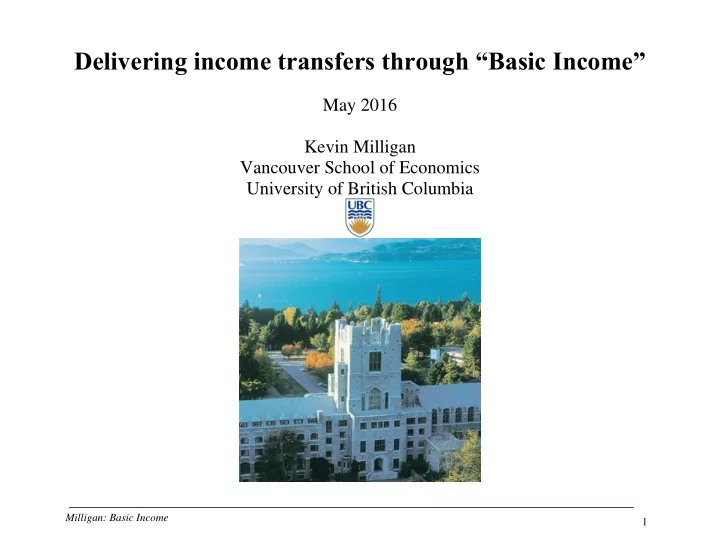

Delivering income transfers through “Basic Income” May 2016 Kevin Milligan Vancouver School of Economics University of British Columbia Milligan: Basic Income 1
Question: Should we use “Basic Income” for income support? 1. Why do we get cheques from government? 2. What is “Basic Income” 3. What problem is this supposed to solve? 4. Costing of Basic Income Schemes 5. What ‘welfare’ really looks like 6. The Basic Income Impossible Trinity 7. Questions to ask about Basic Income proposals Milligan: Basic Income 2
Why do we get cheques from government? 1. Pure redistribution Some care about shape of whole income distribution. Some care about poverty alleviation: efficiency and equity 2. Insurance Because of adverse selection, insurance markets sometimes fail. E.g. employment insurance. Public mandated participation can overcome the problem. 3. Behavioural realities Saving is hard. We might prefer to use government as ‘commitment device’ Milligan: Basic Income 3
The ‘Single Tax’ of Henry George (American, 1839-1897) What Georgist ‘single taxers’ advocated: Fixed supply of land belongs to ‘the people’. Land value should be taxed; some advocate handing it out to all citizens as ‘basic income. This single tax is preferable to taxes on productive activity. Opposed tariffs; all that is needed is land value taxation! Georgism mostly of died out in 20 th century, but seems popular on the internet. They have conventions, factions, and like handing out pamphlets on street corners. Milligan: Basic Income 4
What is “Basic Income”? People seem to have many different ideas in mind, but three key questions for any design: 1. Basic transfer: how much? 2. Phase-out rate: payment decreases with income or not? 3. Does this new program replace all existing government spending? Just the income supports? Some income supports? Milligan: Basic Income 5
Universal vs Income Guarantee Characterize the different models by degree of income phase-out. Phase-out rate Model 0% Universal Basic Income 25% 50% 100% Minimum Income Guarantee / Income top up Milligan: Basic Income 6
What problem is this supposed to solve? There are many claims: Relieve poverty can deliver improved outcomes. Improve work incentives Remove ‘welfare wall’ of current system. Decrease bureaucracy indignity and waste But… Not a great replacement for social insurance like EI or CPP. o Doesn’t provide much insurance for middle earners. o Unless transfer was huge, would make many worse off. Can we realize all these goals at once? Milligan: Basic Income 7
How much would a universal basic income cost? Say, $15,000 per person for basic transfer. (Makes some worse off!) We are 36 million people. Cost of $540 billion, or 27% of GDP. Total federal government revenue in 2016-17: $288B. o Total government revenue (Fed/Prov/Muni) in 2014-15: $745B Does anyone really advocate this universal model? Yes. It’s all over the internet and in op -eds, often without any basic math. Or, see a paper by Periera (2015) arguing how to pay for a $392B Basic Income by raising taxes and cutting spending. Or, see Abdelkrim, Duclos, and Blais ( 2005 L’Actualité économique ) Or, see CCPA 2009 study which costs universal model. Milligan: Basic Income 8
How much would a minimum income guarantee cost? Using 2010 Survey of Labour and Income Dynamics: Topping up all families to the low-income cutoff. About $32B in 2010 $. Giving $15K per adult as minimum income guarantee About $63B in 2010 $. Questions: Of course, this model has 100% tax on labour market earnings, so there are efficiency questions…. How is this different from bigger social assistance cheques? Is this really what people mean when they say “basic income”? Of course, could have different amount for kids, or different basic transfer. Milligan: Basic Income 9
Funding Basic Income What if we cancel some existing income transfers? Social assistance $10-$15B Child Benefits $25B Employment Insurance $21B OAS/GIS $48B CPP/QPP $42B / $14B If you totaled all this, you’d get something like $165B. What if we raise taxes? GST per point ~$6B Corporate income taxes ~$2B per point, assuming static profits. Total untaxed income over $250K $96B (2013) Milligan: Basic Income 10
Can we save on ‘bureaucracy’? What does ‘welfare’ actually look like? Ontario Public Accounts… Administration: $284 Million This is $20/Ontarian. Benefits: $8.03 Billion This is $575/Ontarian. Milligan: Basic Income 11
The Basic Income Impossible Trinity You can choose only TWO of these three features: Large basic transfer Same cost as existing system PICK TWO Low phaseout rate Milligan: Basic Income 12
Policy example that respects the trinity Wayne Simpson and Harvey Stevens University of Calgary School of Public Policy Research Paper Proposal: Make non-refundable tax credits refundable. Some details: Transfer size: Averages $1,436 per low-income taxfiler Phase-out rate: 20% above ¼ of LICO Additional cost: $7.23B Should we do this? It is worthy of debate because they have a realistically- costed plan. Basic Inco me advocates need to show us their math… Milligan: Basic Income 13
Watch for these dubious claims… “Both left and right agree…” ‘right’ likes low phaseout rates; ‘left’ high transfers. Can’t do both at once ---beware the impossible trinity! “Increasing transfers to low incomes boosts health etc.” Does the proposed transfer actually boost low incomes? Or is most of the money going to middle and high earners? “Can pay for it with some simple changes...” How ‘simple’ are those changes to enact? E.g. CPP/OAS. E.g. disability. E.g. fed-prov issues. Even if we could raise the money, would Basic Income be the best way to spend it? Milligan: Basic Income 14
Questions to ask about any Basic Income model 1. The basics: transfer and phase-out rate. 2. Are you canceling existing transfers? Which ones? 3. Will anyone be made worse off? 4. Have you costed the model? 5. How will you raise $X Billion in new tax revenue? 6. What is the gain of raising $XB in new taxes to hand out cheques to middle and high earners? Milligan: Basic Income 15
Recommend
More recommend